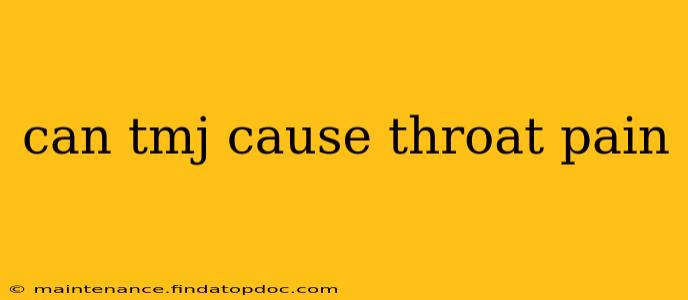Can TMJ Cause Throat Pain? Understanding the Connection
Temporomandibular joint (TMJ) disorders can be incredibly frustrating, causing a wide range of symptoms that often leave sufferers feeling confused and concerned. One common question is whether TMJ can cause throat pain. The answer is: yes, it's possible, but not directly. The connection is indirect and often involves the intricate network of muscles and nerves in the head and neck.
While the TMJ itself isn't located near the throat, the muscles and nerves responsible for jaw movement are closely intertwined with those controlling swallowing, head posture, and throat function. Therefore, problems originating in the TMJ can radiate pain or trigger referred pain in the throat.
Let's delve deeper into the potential mechanisms and explore some frequently asked questions:
How Can TMJ Problems Lead to Throat Pain?
TMJ disorders often involve muscle tension and inflammation. When the muscles of mastication (chewing) become overused, strained, or inflamed due to TMJ dysfunction, this tension can spread to surrounding muscles in the neck and throat. This can lead to pain, stiffness, and discomfort in the throat area.
The intricate network of nerves in the head and neck also plays a crucial role. Nerve irritation stemming from TMJ problems can send pain signals to areas far removed from the actual source, a phenomenon known as referred pain. This explains how TMJ issues can cause throat pain even though there's no direct damage to the throat itself.
What Are Other Symptoms Associated with TMJ?
Recognizing a connection between TMJ and throat pain often requires considering other symptoms. Common TMJ symptoms include:
- Jaw pain: This is the most common symptom, often felt in the joint itself or surrounding muscles.
- Headaches: TMJ disorders frequently lead to headaches, particularly tension headaches.
- Earaches: Pain in the ear is another common symptom, often misdiagnosed as an ear infection.
- Neck pain: The muscles of the neck and jaw are interconnected, so neck pain is often associated with TMJ issues.
- Clicking or popping in the jaw: This is a common sign of TMJ dysfunction.
- Limited jaw movement: Difficulty opening or closing your mouth wide can indicate a problem.
- Facial pain: Pain in the face, particularly around the jawline, is another possible symptom.
Can TMJ Cause Difficulty Swallowing (Dysphagia)?
While throat pain is a possibility, TMJ disorders can indirectly contribute to difficulty swallowing (dysphagia). The intricate muscle coordination required for swallowing can be disrupted by the muscle tension and inflammation associated with TMJ. This is particularly true if the muscles surrounding the throat are directly impacted by the referred pain or tension.
How Is TMJ-Related Throat Pain Diagnosed?
Diagnosing TMJ-related throat pain requires a thorough examination by a healthcare professional, typically a dentist specializing in TMJ disorders or an oral surgeon. They will assess your jaw joint, palpate the muscles of mastication, and review your medical history. Imaging techniques like X-rays or MRI scans may be used to rule out other potential causes.
What Treatments Are Available for TMJ-Related Throat Pain?
Treatment for TMJ-related throat pain often focuses on managing the underlying TMJ disorder. Options may include:
- Pain relievers: Over-the-counter medications like ibuprofen or naproxen can help manage pain and inflammation.
- Muscle relaxants: Prescription muscle relaxants may be used to alleviate muscle spasms and tension.
- Physical therapy: Exercises and stretches can help improve jaw mobility and reduce muscle tension.
- Splints or mouthguards: These devices can help realign the jaw and reduce stress on the TMJ.
- Lifestyle modifications: Adjustments to diet, posture, and stress management techniques can help prevent exacerbations.
- Injections: Corticosteroid injections can reduce inflammation in the TMJ.
- Surgery: Surgery is generally a last resort for severe, intractable cases.
Disclaimer: This information is for educational purposes only and should not be considered medical advice. Always consult with a healthcare professional for any health concerns or before making any decisions related to your health or treatment. They can accurately diagnose the cause of your throat pain and recommend the most appropriate course of action.
